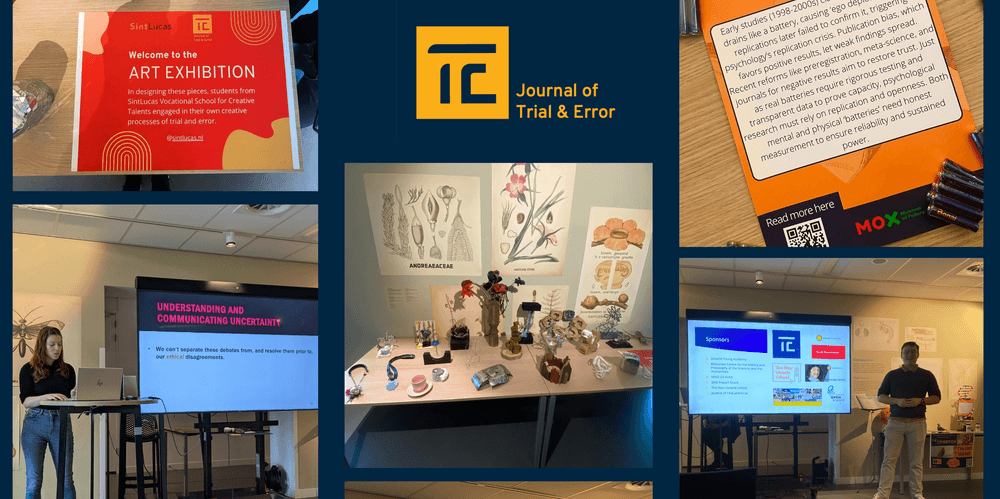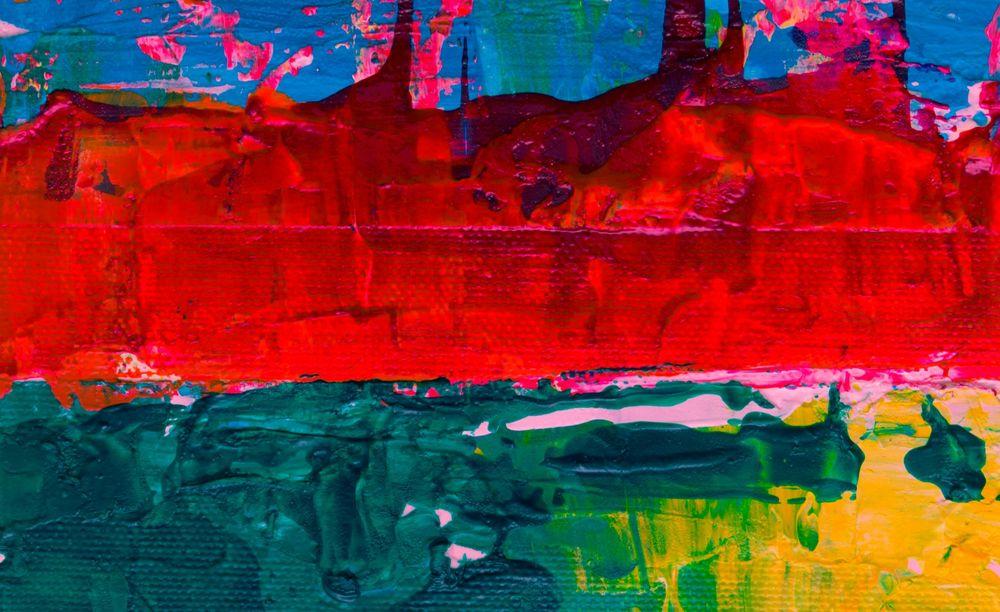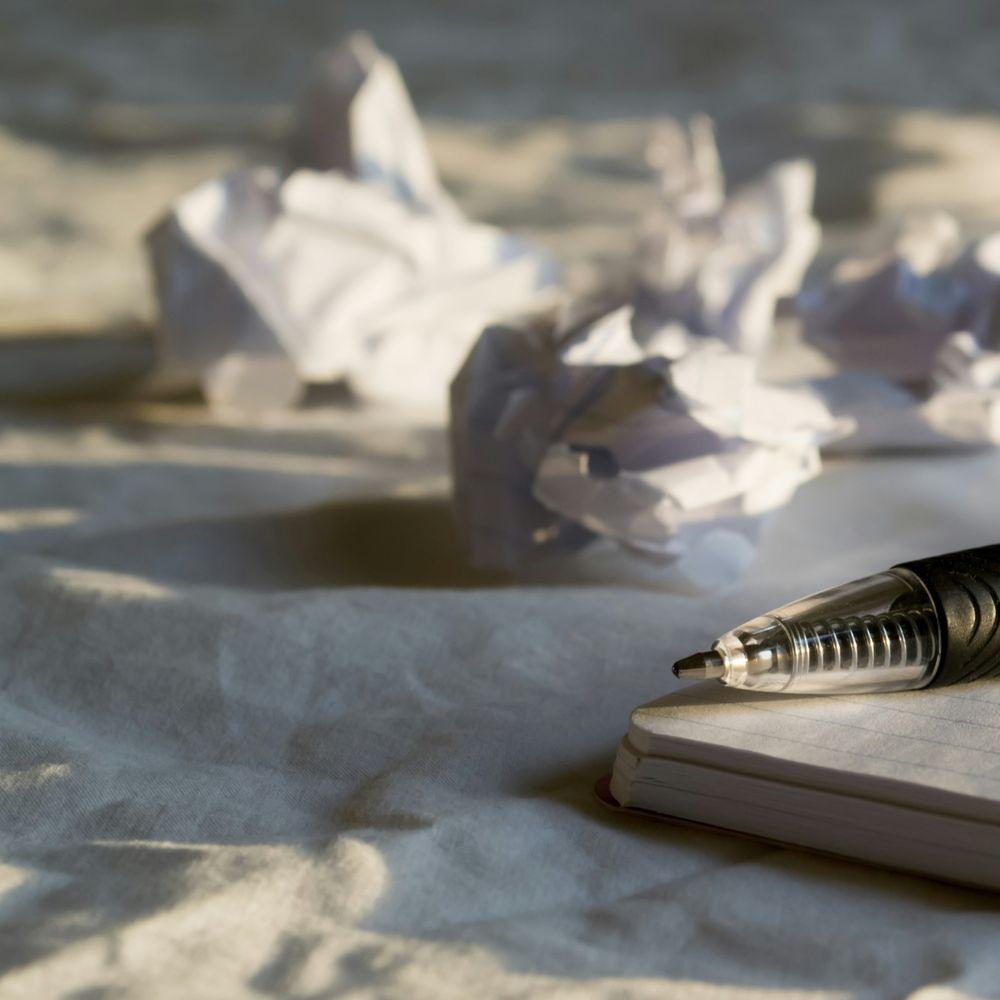~ 7 min read
Trial & Error Symposium 2025: Honesty, Openness, and Cultural Change
By JOTE
On October 7th, 2025, the University Museum Utrecht hosted the first-ever Trial & Error Symposium - a day dedicated to rethinking how science values failure, uncertainty, and openness. The event brought together researchers, editors, students, and communicators to confront a familiar problem: our cultural reification of positive and novel insights over and above negative, neutral, and replicative studies.
At the Center of Trial & Error, we believe in transforming this culture so that failure, negative and null results, and rejections are finally understood as a natural and vital part of the scientific process, rather than an obstacle to be hidden or overcome. The symposium explored how to make that belief a reality in research culture, through talks, workshops and even art. Topics ranged from publication bias and communicating uncertainty to the ethics of retractions and the value of sharing failure as collective progress.
Cultural change and uncertainty
We began the day with a keynote talk by Dr. Noémie Aubert Bonn, whose talk ‘The Problem of Positive Publication Bias and How to Bring About Cultural Change in Science,’ set the tone for the event. Noémie explored how systemic incentives shape what kinds of results are seen as valuable, and challenged us to consider how to mitigate bias while redefining what success could look like in scientific research.
Following Noémie’s keynote, participants took part in an interactive icebreaker activity organized by our Chair Stefan Gaillard. The participants split into groups and were given sets of scientific findings, some real, some misleading and some entirely false. Through debate and discussion, the participants had to decide what they thought of these findings - some groups focused on statistical abnormalities while others relied on their own expertise to judge the findings. When we reconvened, one theme emerged: we were, by and large, highly skeptical of all the findings.
Of course, there’s a selection effect at play, but nonetheless it was interesting to see how distrustful we were of the findings. This points towards something that we’ve believed at the Center of Trial & Error: increasing the visibility of scientific failures rather than only publishing positive results will help make scientific research more trustworthy. By taking away the incentive to fraudulently present failed research as successful, positive findings become more credible and scientifically meaningful.
This exercise ended up flowing perfectly into the next talk after the coffee break, where Dr. Lucie White gave a talk on ‘Communicating Uncertainty.’ Lucie’s presentation addressed how scientists can engage with the public honestly about the limits of knowledge, without diminishing trust. She argued that uncertainty, when framed correctly, can actually increase credibility by showing that science is self-correcting and evidence-based rather than dogmatic.
Throughout the day we exhibited art made through a process of trial-and-error by students of SintLucas, as well as an exhibition about historical cases of trial-and-error in science, developed together with the Museum of Failure. The digital variant of this exhibition can be found here.
AI and transformational leadership
In the afternoon, Dr. Maximilian Roßmann, presenting research conducted with Auste Valinciute, delved into the often misunderstood world of retractions in academic publishing, looking into the causes, consequences, and potential for reform. Max’s talk emphasized that retractions should not be understood as shameful, but as a form of scientific accountability. Retractions are evidence that the scientific system can correct itself, a shining example of the way in which scientific failure plays an important and positive role in scientific research.
Our final guest speaker of the day, Dr. Veronika Cheplygina led a workshop entitled, ‘Showcasing Your Failures,’ in which participants were guided through CVs of failures and explored all the ways in which failure presents itself as a normal part of our daily experience. The workshop was a reminder that vulnerability can be a source of strength in academia.
The day culminated in the Trial & Error Award Ceremony, presented by Stefan Gaillard. The Trial and Error Award celebrates the courage to share scientific failures publicly, recognizing that such transparency strengthens science as a whole. This year, we opened nominations to anyone who has published scientific failures in any venue. Our team narrowed down the nominations to four groups of contenders that we felt best exemplified the spirit of the award: the authors of ‘AI-based virtual assistant and transformational leadership in social cognitive theory perspective: a study of team innovation in construction industry’, the authors of ‘No support for a causal role of primary motor cortex in construing meaning from language: An rTMS study’, the authors of ‘Proactive and retroactive effects of novelty and rest on memory’, and the authors of ‘Limited data prevent assessment of role of climate change in deadly floods affecting highly vulnerable communities around Lake Kivu’.
We decided to choose the final winner through a lottery because we have not yet set up objective criteria to determine the winner of the award - something we aim to establish for next year. This year’s winners were the authors of ‘AI-based virtual assistant and transformational leadership in social cognitive theory perspective: a study of team innovation in the construction industry’. They investigated how AI-powered virtual assistants and transformational leadership interact to influence team innovation, focusing on the construction industry through the lens of social cognitive theory (SCT). Their initial hypothesis predicted a positive correlation between the use of AI tools, leadership style, and innovation outcomes. However, pilot tests revealed several methodological challenges, failed attempts at causal verification, and noticeable participant resistance to AI adoption. As a result, the team revised their theoretical framework multiple times before finally settling on a more complex interpretation grounded in SCT.
Normalizing failure
We are deeply grateful to everyone who made this day possible, especially our speakers, volunteers, collaborators, audience, and funders. The symposium was a shared achievement. Meaningful cultural change requires the collaboration of countless stakeholders such as scientists, funders, institutions, journals, and the public. We are proud that the Center of Trial & Error is emerging as one of the loci where that transformation begins.
When we began as a small group of students determined to talk about the role of negative and null results in science, we could not have imagined standing here today hosting a full symposium on our core ideals. Over the years, the Center of Trial & Error has grown into a platform for open conversation, scholarly experimentation, and cultural critique. Our mission remains clear: to normalize failure, negative and null results, and to question incentives that distort knowledge production.
A special thank you to our collaborators, the Museum of Failure, Utrecht Young Academy, Young Academy Twente, and The New Utrecht School, to our funders: The Descartes Centre, the GKG Impact Grant, the NWO OS Fund, Utrecht Young Academy, to The New Utrecht School, and to the students of SintLucas for their art works.
We look forward to the next chapter of the Center of Trial & Error, and to a scientific culture that is braver, more honest, and more just.
Please see below for the PowerPoint slides of the talks, the workshop, the award ceremony and the icebreaker activity.
‘The Problem of Positive Publication Bias and How to Bring About Cultural Change in Science’, by Dr. Noémie Aubert Bonn
The Icebreaker Activity, by Stefan Gaillard
Understanding Uncertainty, by Dr. Lucie White
Framing Retractions in Scientific Media, by Dr. Maximilian Roßmann
‘Showcasing Your Failures’, by Dr. Veronika Cheplygina
Presentation of Trial and Error Award Nominations, by Stefan Gaillard
License
Trial & Error Symposium 2025: Honesty, Openness, and Cultural Change by JOTE is licensed under a Creative Commons Attribution 4.0 International License.




